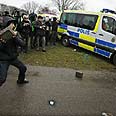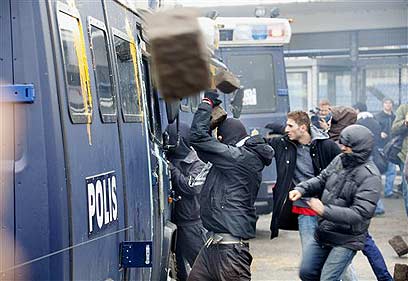
Swedish Jews undeterred by protests
While local Jews admit notable rise in anti-Semitic atmosphere after protest against Israel-Sweden tennis match, Israeli envoy blames riots on small groups of extremists, says public debate on Israel in media may have deterred many from protesting
Despite Saturday's anti-Israel protest in Sweden, in which rocks, eggs and firecrackers were hurled at police outside a sports arena in the city of Malmö during an Israel-Sweden tennis match, the country's Jews say they feel safe in the Scandinavian country.
Israeli Ambassador to Sweden Benny Dagan told Ynet following the incident that such protests were part of a wave of aggression coming over Europe. "There is a rise in anti-Semitic incidents, it's happening here in Sweden as well," the ambassador said.
However, Dagan said, the activists taking part in such protests come from a number of different camps, including extreme leftist organizations, neo-Nazis and Islamic bodies. "I don't think there's an organization that comes and operates systematically," he noted.
Elad Meier, a Bnei Akiva and Jewish Agency envoy to Sweden, told Ynet the protest was actually a failure for the organizers.
"There were a few neo-Nazi organizations that said they would do anything to stop the matches, but in the end a handful of 1,500 people showed up. Local media reported the security forces were prepared for protests of about 20,000 people," he said.
Jewish resident: I feel 100% safe
"I personally feel 100% safe. I have three children here and they go to school with a Star of David chain and no one ever says a word to them," said Sofia Lunderquist, of Malmö.
Lunderquist was one of the few Israel supporters allowed to watch the tennis match that was held without fans for security reasons.
"We were a rather large Israeli crowd of about 100 people. We made a lot of noise in good spirits. When we entered the arena, the protesters were on the other side – we didn't feel a thing.
"There were about 1,000 police officers and surprisingly, there was very little fuss. They have been preparing for this for two-three months already," she said.

Protestors clash with police in Malmö Saturday (Photo: AP)
But things aren't necessarily all rosy in the city of Malmo, that contains a large Muslim community.
"There has been a different air in the city since the war in Gaza, everything is so one-sided. It's legitimate to say that what Israel did is horrible, but they don't look in depth, and so, any ordinary Swede that doesn't really know or care just thinks, 'Ah, Israel, they did something horrible in Gaza'," Lunderquist said.
"I am trying to educate the Swedes I know to give them a different picture. Even if I don't agree with what Israel does, I give them more information. On the other hand, when I talk with Israelis, they don't understand the European side, which puts me in the middle."
'Public debate weakened protests'
Ambassador Dagan said, "We have decided not to hide behind the walls and closed offices but to be active every way we can – in the parliament, media, and universities."
According to Dagan, the tennis matches raised a public debate in Sweden like never before for such events.
"There were many articles in the newspapers, including editorials that condemned mixing sports with politics and isolating Israel in a bad light and picking on it, asking why people only protest against Israel while it's a democratic country and such means are never used against totalitarian countries."
Dagan said such debates "may have created a feeling that this is not the right thing to do, and it deterred people who are not extremists that were thinking of coming (to protest)."
The Jewish community of Malmö is made up of a few hundred Jews, and also includes a Chabad center headed by Rabbi Shneur Kesselman, who said Saturday's protest was not held by locals of the city, but by a group of outsider extremists from around Sweden and neighboring Denmark, who came to the city specifically for this purpose.
"There are a lot of Palestinian and Lebanese immigrants here that call themselves Palestinians. They are just a large amount and this effected the local authority's decision to close the game to spectators," the rabbi said.
Kesselman added that two pro-Israel protests were also held in the city recently. According to the city's Jews, with local elections set for next year in Malmö, politicians are taking extra precautions due to the large immigrant communities.










